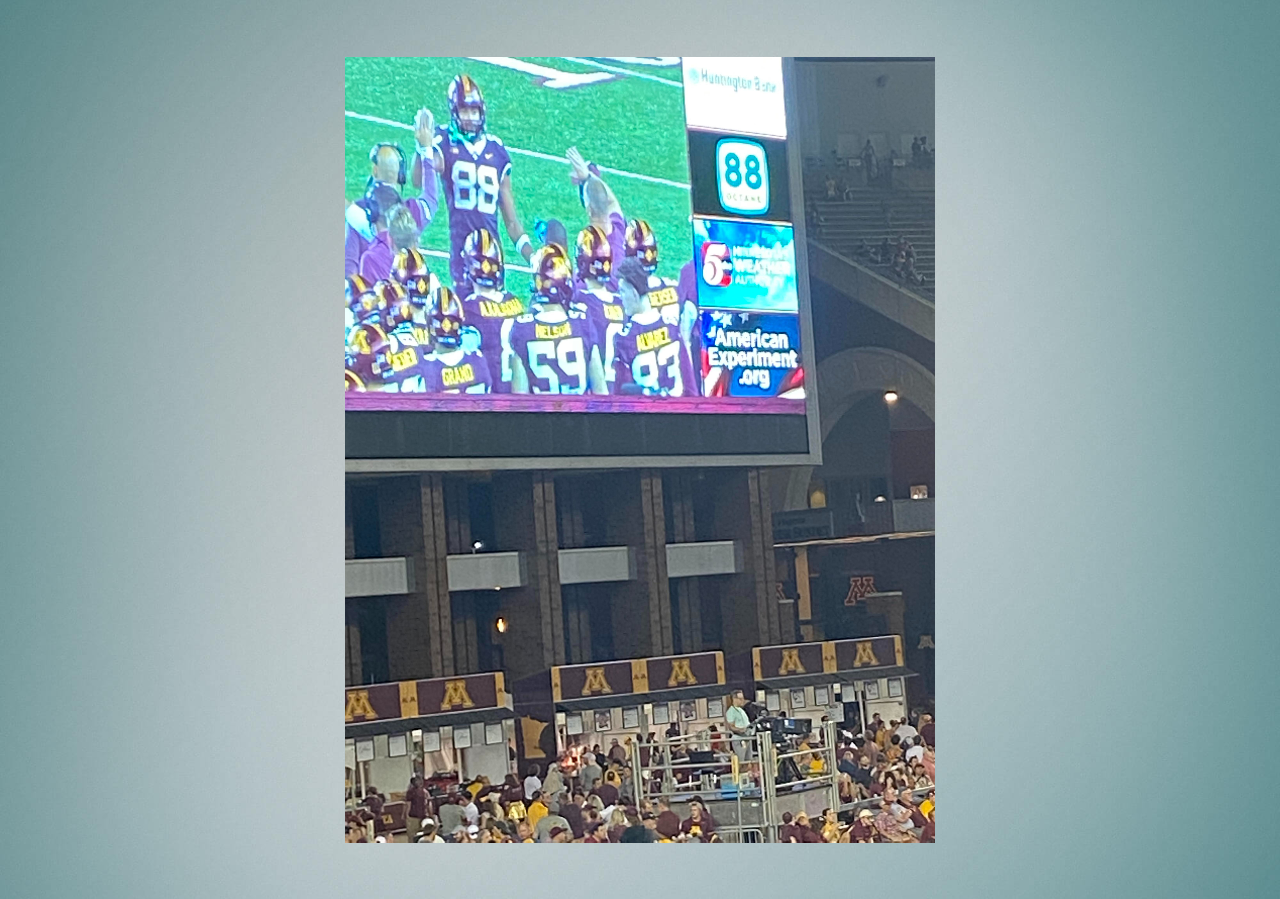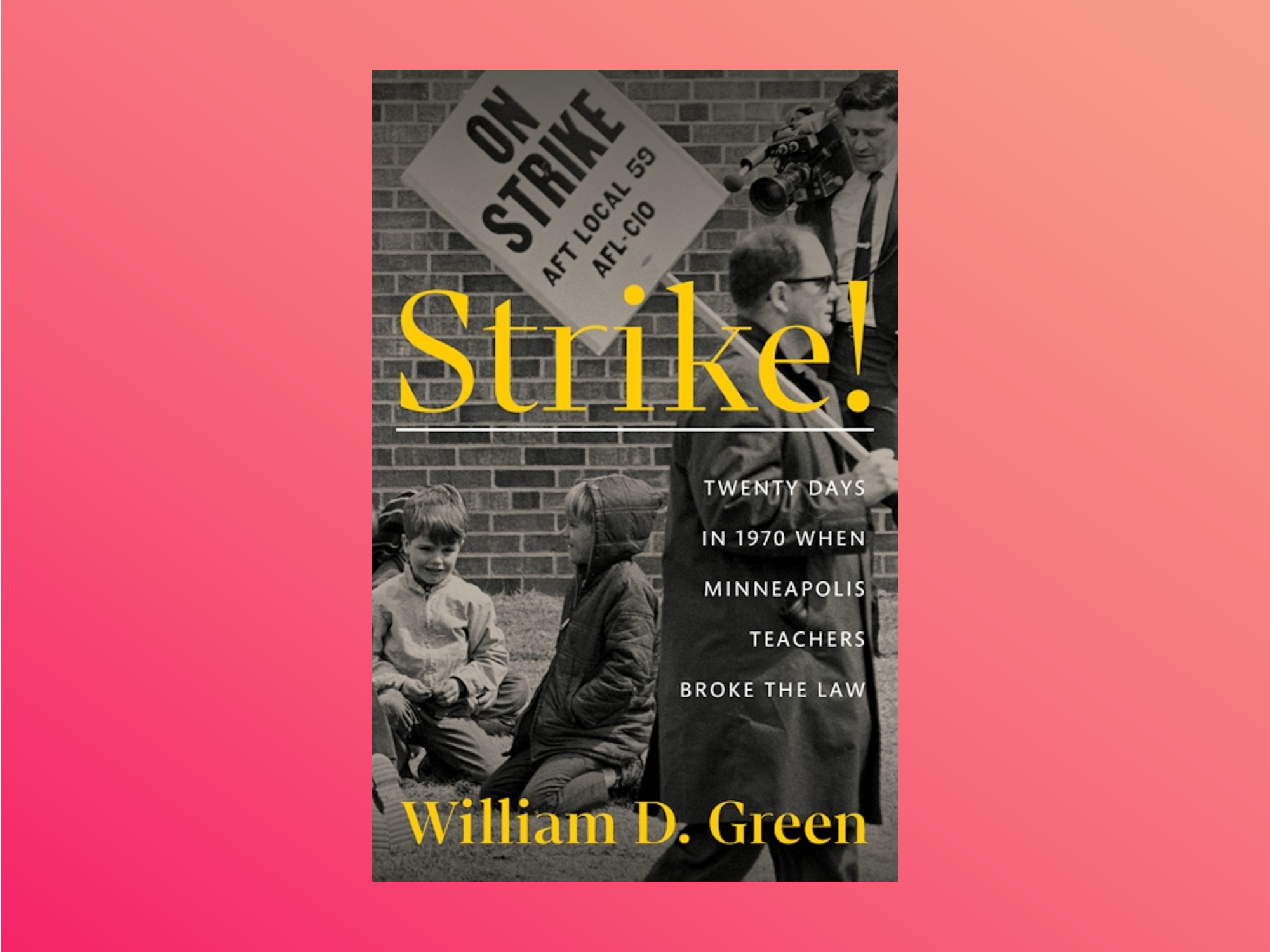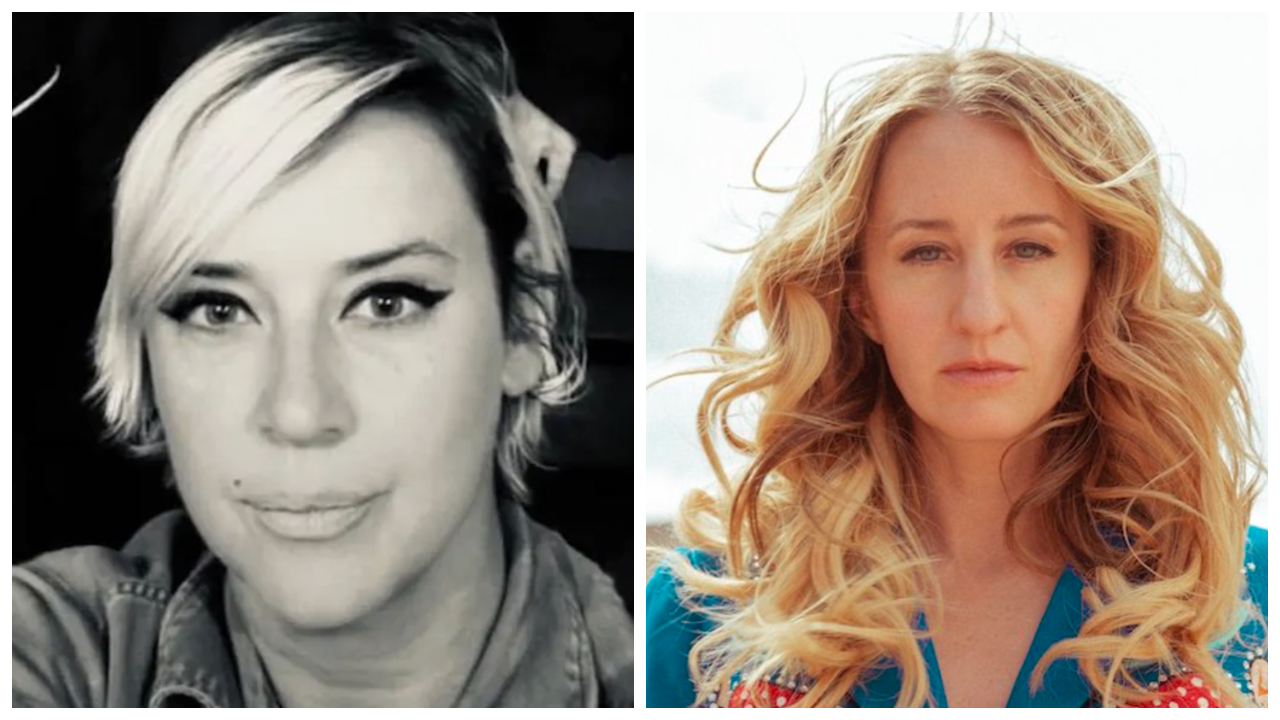If you’ve been to a Gophers game during the past couple years, you may have noticed a simple ad on the scoreboard: white text reading AmericanExperiment.org over an American flag background. That’s the website for the conservative Golden Valley-based think tank Center of the American Experiment (CoAE). Founded as a nonprofit in 1990, CoAE takes reliably conservative positions on government spending, education, taxes, labor unions, crime, and other issues. Energy policy is another key area of focus. If you go to the site’s “Energy & Environment” section, you’ll find a variety of articles that portray renewable energy as unreliable and expensive, and oppose policies designed to boost renewables.
Because of its divisive political commentary, CoAE becoming a prominent Gophers sponsor has caught the attention of some fans and U of M students. “Right-wing think tank Center of the American Experiment, which promotes hate and bigotry, gets to serve ads during tonight’s University of Minnesota Gophers game,” a poster wrote two years ago on a local subreddit, attracting 575 upvotes and nearly 200 comments. The Pioneer Press has described CoAE as a “key player…in Minnesota’s conservative politics.” So much so that President-elect Trump’s deeply controversial nominee for Secretary of Defense, Forest Lake-raised Pete Hegseth, participated in two CoAE roundtables, in 2016 and 2017, on the subject of “family fragmentation.” This past January, two intentional fires were set at the office the CoAE shared with two other conservative groups, according to the ATF; no one has been arrested.
According to Jake Ricker, senior director of PR at the University of Minnesota, the Center of the American Experiment has a sponsorship agreement with the Gophers which involves ads in stadiums and during radio broadcasts of men’s football and hockey games. The cheery radio spots position the think tank as a “nonpartisan” voice for everyday Minnesotans.
“We've received similar inquiries about other advertisers in the past, including when Planned Parenthood was an active advertiser in our athletics venues,” Ricker writes via email. “Our mission commits us to upholding the freedom to express and debate ideas… we are not in a position to deny ads based solely on an organization’s beliefs. The U of M does not endorse the beliefs of our advertisers.”
I pointed out that the U of M has made sprawling lists of commitments to address climate change, including a pledge to go carbon neutral by 2050. “We are committed to incorporating sustainability into all aspects of the institution,” Ricker writes. “We are also committed to being a leading voice that brings forward the scientific data and facts about climate change.”
I asked Bill Walsh, director of communications for CoAE, whether his organization acknowledges the need to plan for a carbon-free future. “I assume you mean carbon-dioxide, and as an organization we have never taken a position on eliminating carbon-dioxide,” Walsh writes via email. I clarified that I was referring to methods of electricity generation that emit lots of greenhouse gases. “I would not say we support transitioning away from fossil fuels,” Walsh wrote back.
In 2016, Peter Zeller, who is now CoAE’s director of operations, wrote on the group’s website that “any warming that does occur is likely to be modest and cause no net harm to the environment or human well-being.” I asked Walsh if his organization generally believes that anthropogenic climate change is happening and likely to be harmful.
“The challenge of your question is we don’t really take specific positions on issues like a political party or candidate. We speak through our research and writing,” Walsh writes. “I imagine the piece you found from Peter was really old since he doesn’t write for us anymore.”
Jane Kirtley, a law professor at the U of M, points to this sponsorship policy, which Ricker confirmed applies to Gopher Athletics. The policy lists several reasons why a sponsorship might be “unacceptable,” including if it conflicts with university policies, negatively affects the U’s reputation, or is obscene or discriminatory.
“I think what the university relations people told you is right, that the university really isn’t supposed to be articulating a preferred position on controversial issues,” Kirtley says. But she was concerned about what she saw as the lack of clarity in the policy. “Unacceptable, according to who or what?” she asks.
According to Ricker, the conditions listed in that policy are the only ones that the university uses to determine whether a sponsorship is unacceptable. “To avoid terms being vague and subject to broad discretion, the circumstances under which an advertisement will be deemed unacceptable and must be declined are defined,” he writes. (You could also argue that certain other Gophers sponsors, like UnitedHealthcare or Hormel Foods, aren't exactly shining examples of corporate responsibility.)
Jeremiah Bohr is a sociologist at the University of Wisconsin-Oshkosh who has studied what is sometimes called the climate change counter-movement (CCCM). According to Bohr, many of these conservative groups make up an informal network.
“[They] share a lot of similar ideology about the role of government,” he says. “I think that’s what ties all of this together, is that climate change brings out a lot of issues that imply the role of government.”
Galen Hall is a sociology PhD student at the University of Michigan who has also researched CCCM groups. He says that he and his colleagues included groups that advocated either for both climate denial and “climate delay” under the loosely knit CCCM banner.
CoAE is a member of the State Policy Network, which Walsh, the CoAE spokesman, described as “a national network of center-right think tanks.” In 2022, ProPublica called SPN “a group of influential state-level think tanks that push for deregulation and tax cuts.” Hall says he’s “not too familiar” CoAE, specifically. However, he notes that many SPN member groups take part in the climate change counter-movement. “A huge number of these organizations have at some point or another been relatively open climate denial groups and/or climate delay,” Hall says, adding that “the central organizing members of the climate counter-movement” are part of SPN.
“A climate delay group could be one that uniformly opposes climate change mitigation policies, but not on the explicit grounds that climate change isn’t real,” Hall says, highlighting the fluid nature of this boundary. “The same group might have once promoted climate denial and now have decided that that doesn’t fly with their target demographics, and so they moved to climate delay.”
I asked Walsh if CoAE has ever accepted donations from fossil fuel companies.
“As with all 501(c)(3) organizations, we respect the privacy to which our donors are legally entitled,” he writes. “That being said, we are a grassroots organization supported by 10,000 individual Minnesota donors whose median donation is around $50.”
“If a Minnesota nonprofit chooses to disclose its donor list or other donor information, it should generally be with the donor’s consent,” Jennifer Urban, an attorney and founder of Legal For Good, a St. Louis Park-based law firm that works for nonprofits, writes via email.
Of course, climate change is real, and we really do need to decarbonize our electric grid.
Michael Roberts is an economist at the University of Hawaii who studies renewable energy. Based in part on preliminary data, he says that a renewable grid wouldn’t cost much more than what we currently pay. “It’s probably no more expensive and probably cheaper than today for a fully decarbonized system,” he says.
David Timmons, an economist at the University of Massachusetts, suggests that making predictions about the future cost of renewable energy—like CoAE does again and again and again—is uncertain: “It’s certainly in the ballpark of what we spend now. Perhaps somewhat more, perhaps somewhat less, depending on exactly how everything unfolds.”
“There’s certainly no solution to climate change that includes the use of fossil fuel tools,” Timmons says.
Just don't expect to hear anything about that during the next Gophers football game.






